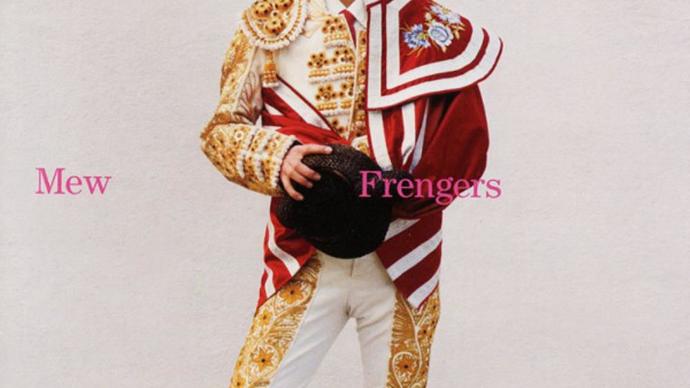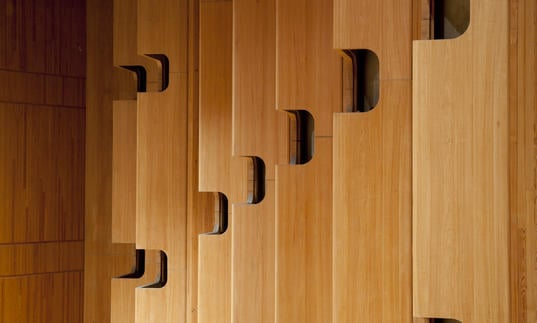Mew – Frengers
The performances will begin promptly at their advertised start times (4pm & 8.30pm)
Running time: 2 hours – including interval
Timings are approximate and subject to change

Elisa Bray speaks to Mew about how Frengers changed their lives and how it feels to be revisiting the record with a string quartet fifteen years later.
There’s a turning point for bands that make it – a record label deal or some chart success – where they can wave goodbye to their day jobs and sleeping on friends’s sofas while on the gigging circuit, and embrace the comfort of hotels, tour buses and roadies. For Danish alternative rock band Mew, that turning point was the release of their third album, and major label debut, Frengers. Released in 2003, it brought them their first commercial success outside of their native Denmark. And today at the Barbican, to mark the fifteenth anniversary of the album, Mew are performing it in its entirety for the very first time, with a string ensemble – in their only UK shows of this year.
‘The Frengers album changed everything for us, and turned our lives upside down,’ says lead vocalist Jonas Bjerre Terkelsbol. ‘We all moved to London and left behind our home and jobs, so it was quite an adventure.
‘We’ve realised over the years that this album has a special meaning to a lot of people, and I think a lot of the searching we were doing at the time, figuring out who we were, really, was relatable to a lot of people who shared some of our sensibilities. And I think the album reminds people of that time in their lives. We thought, since its fifteen years ago this year, this was a good opportunity to revisit it, and play the album in full.’
Frengers indeed changed everything for the band. In 2001, in the lead up to its release, the band had moved to London, into a small apartment in Islington with four bunk beds in one of the two rooms, and were driving themselves around in a mini-van. Then Frengers arrived – their first international release, which marked a move onto the major Epic label, from their own Evil Office, and led to them being picked up by Alan McGee of Creation Records who became their manager.
But the album had just as big an impact on the music scene. Mew helped to redefine the possibilities of indie-rock, bringing together prog rock, heavy metal, grunge, lo-fi, pop hooks and floaty dream-pop influences on Frengers. The album, just like its title – a combination of the words ‘friend’ and ‘stranger’ – straddled the epic and intimate, melodic innocence and disarming experimentalism, warm distortion and glacial atmosphere.
‘I remember the musical landscape when it came out, as being full of bands that were slightly ironic,’ says Bjerre, offering his take on why the band were so influential. ‘There were really good bands, but a lot of them kind of did their thing tongue-in-cheek, like they didn't really mean it, or like it was a pastiche of something that used to be meaningful to people. I think we, and a few other bands at the time, offered people something really honest and heartfelt. Also, we always just followed our instincts, and our curiosity, and that made for a very different sound from what the scene otherwise had to offer.’
The songs of Frengers were composed over a number of years, while the album’s recording happened in a variety of places. And the album’s melting pot of influences was a natural manifestation of the band’s diverse musical tastes over the years, says Bjerre. ’I think we always just followed our collective instincts, and I guess we absorbed a lot of different music all through our lives. We grew up with Eighties pop, and a lot of that stuff was really clever and inventive, but very immediate at the same time. Then when we were teenagers, Nirvana opened our eyes to alternative music.’ Their love of Nirvana led to discovering bands like Pixies, Sonic Youth, Dinosaur Jr, My Bloody Valentine, ‘and a lot of bands that were much weirder than what we'd been exposed to before. A lot of things just seeped into our band chemistry. But I think what our music became was mostly due to the people in the band, and how our different perspectives influenced each other.’
Today, the trio are joined by a string quartet led by Emma Smith (Elysian Quartet / Phaedra Ensemble) to celebrate and recreate live the influential album, which they reissued as a deluxe version earlier this year to mark its anniversary. ‘We wanted to do something special for the Barbican show. We haven't changed the songs as such – that wouldn’t make sense as we want to revisit the album, and deliver the songs the way people remember them. But the strings will add to the sonic texture and add some lovely new details. Some of it will feel very intimate; it's going to be beautiful.’
As well as a performance of Frengers from start to finish, expect other highlights from their seven-album back catalogue: b-sides from the Frengers days, some of their most popular songs, and some of their deeper cuts.
‘It's going to be a full-spectrum show!’ says Bjerre. ‘It feels really good [to be celebrating Frengers], a bit nostalgic – in a good way. I think the same is true for our audience as well.’
The performances will begin promptly at their advertised start times (4pm & 8.30pm)
Running time: 2 hours – including interval
Timings are approximate and subject to change
In an effort to be more sustainable, and in the spirit of The Art of Change, this digital programme is part of a trial we are conducting to discontinue printed freesheets.
Performers
Mew are:
Jonas Bjerre Terkelsbol vocals, guitar
Johan Wohlert bass
Mads Wegner guitar
Silas Jorgensen drums
Nicholas Watts keyboards
Emma Smith violin
Jennymay Logan viola
Richard Jones cello
Laura Moody double bass
Discover

Listen: Mew - Frengers
Listen to prog-rock quintet Mew's 2003 album, Frengers: Not Quite Friends, But Not Quite Strangers'...

Listen: Barbican Recommends
Not sure what to listen to? Every month we update our Barbican Recommends Spotify playlist with what we've been listening to in the office. Expect everything from Punk to Jungle to Classical.
You might also like...

+ Kathryn Joseph
Barbican Hall
Location
The Barbican Hall is located within the main Barbican building. Head to Level G and follow the signs to find your seating level.
Address
Barbican Centre
Silk Street, London
EC2Y 8DS
Public transport
The Barbican is widely accessible by bus, tube, train and by foot or bicycle. Plan your journey and find more route information in ‘Your Visit’ or book your car parking space in advance.
We’ve plenty of places for you to relax and replenish, from coffee and cake to wood-fired pizzas and full pre-theatre menus
Mobility
Spaces for wheelchair users in row U at the rear of the stalls (up to sixteen, depth of row 180cm) and the back row of the circle (four), both with fold-down companion seats. Some seats in row S of the stalls for people with very limited mobility.
Assistance dogs
Assistance dogs may be taken into the concert hall where there are a limited number of suitable seats in row G of the stalls. If you prefer, you may leave your dog with a member of the cloakroom staff during the performance.
Hearing facility
There is an induction loop in the concert hall. You can use this by adjusting your hearing aid to the ‘T’ setting.
Free large-print programmes
These are available for most of our concerts. Please contact [email protected] at least a week beforehand, to prebook a large-print programmme.
For more access information, please visit our Accessibility section.
Plan your vist
Meet friends, grab a drink, drop in to one of the free installations on Level G before the show - here's what else is happening at the Barbican when you visit.








